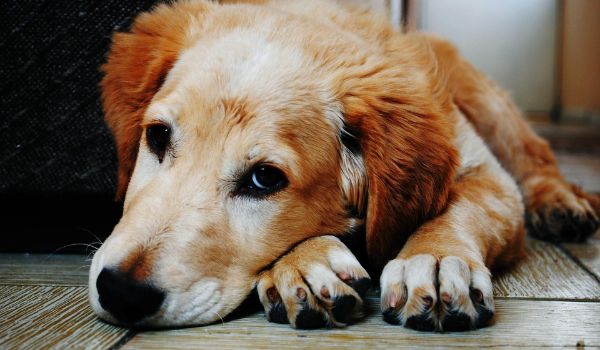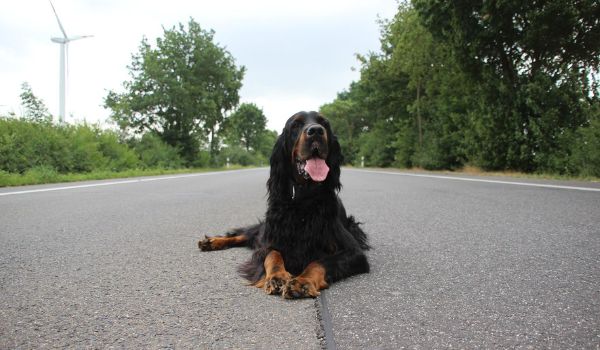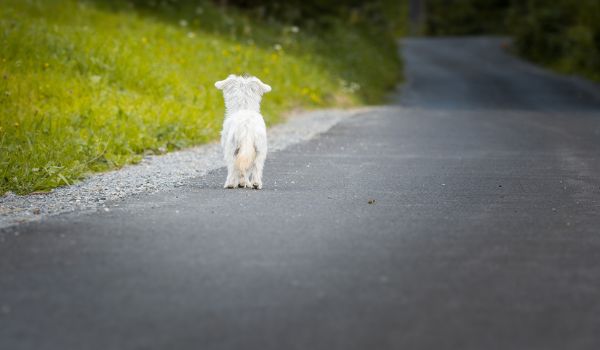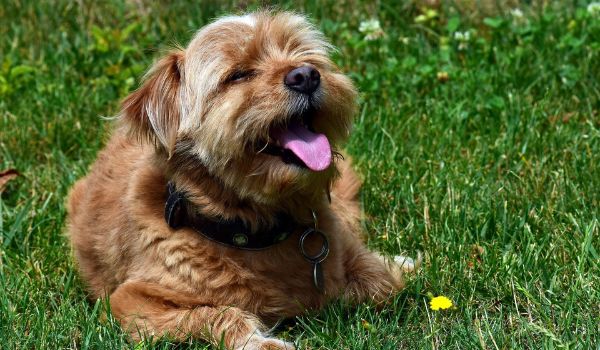For ages, dogs have been our best friends, serving us in a great array of roles—from protection to guarding and from herding to simply being our companions when we need them. Studies show that dogs greatly improve our quality of life and overall health; their presence reduces our stress, anxiety, and depression and eases our loneliness.
But when they themselves become scared, it is a reason to worry, especially when owners feel that they are the source of their fear. “Why is my dog scared of me?” you may think. The one who would always sit and cuddle with you but is now trying to avoid you and hide in his crate.
If you feel so, it must have deeply hit you to be someone that triggers anxiety and fear in your dog.
Why Is My Dog Scared of Me? 6 Possible Reasons
Milla Salonen and her colleagues found out that more than 70% of dogs belonging to different breeds show anxiety-like behaviors. There can be many reasons, but sometimes it can be YOU. It is totally acceptable and logical to think that way. Below, we list down a few reasons why your dog feels scared of you.
Genetic Causes
You might not believe it, but researchers have discovered that fear is a heritable trait. Fear and anxiety behavior in parents make their pups scared of people, including you. But genetics is not everything; there are environmental factors that contribute to developing fear in dogs.
You Have Adopted an Abandoned Dog
Adopting a dog that had abusive past experiences could make him scared of you. Roughly 5 to 17% of dogs have canine PTSD. “We don’t always know what may cause PTSD in dogs, but some potential causes are military or police work, being a bait or fighting dog, being raised in a puppy mill, severe abuse, living as a stray after being abandoned, trauma from a disaster (flood, fire, earthquake, tornado, explosion), or being attacked by other dogs or animals,” says Dr. Lori Teller, an associate professor in the Texas A&M College of Veterinary Medicine & Biomedical Sciences, said.
The abuse may have come, intentionally or unintentionally, from humans. That’s why your physical features as humans make your dog scared of you. But note that PTSD has many causes; only your features may not be the reason your dog feels scared of you. But if your dog loved you like crazy and now suddenly started ignoring you, probably it’s not the dog’s past making him fearful of you.
Dog Rescued From a Shelter
You would be surprised to know that about 72% of dogs have shown anxiety and aggressive behavior after being adopted from a shelter, claimed Svatava Vitulova and her colleagues. Although they look fine at first, after some time, they start to show fearful behavior towards you. Like humans, dogs also need a break to heal their wounds and acclimatize with your home environment and you.
Scolding/Punishing Your Dog May Cause Fear
One reason your dog acting withdrawn may be that you have scolded him, even if it wasn’t your intention. Let’s say he has broken your beautiful vase, and you reacted disproportionately to him. He might interpret you as an aggressive human, and slowly, he will lose trust in you and be afraid of you.
Similarly, physical or direct interactive punishment makes your dog scared of you. Punishments should always be positive, mild, and properly timed, ideally within 2 – 3 seconds when a behavior starts. If you apply wrong punishment techniques, such as excessive scolding or throwing something at your dog which may hurt him, your dog will get scared of you and even your family members.
Shyness and lack of socialization
Being shy and lacking socialization can also be why a dog is afraid of you. This usually happens when you bring home an adolescent dog that remained isolated previously. As per Safarivet, “Puppies socializing between six and eight weeks respond to human beings much better as adults than puppies allowed to socialize before or after that time. Puppies that did not receive any socialization with [humans] during the critical period were essentially unapproachable and untrainable as young dogs and adults.”
Similarly, Kennelosis, a syndrome that can occur after dogs are excessively caged in shelters and puppy mills, may also cause your pup to be scared of almost everything around him, including you.
Medical Issue
Lastly, medical issues. One day your dog is cuddling with you, and the other day, your dog is ignoring you. And when you try to come near, he feels scared. There could be an underlying health issue, perhaps a wound, or some other dog sickness. Since dogs can’t speak, but their behavior does, we can easily tell when they are not doing well. Their pain is then depicted in the form of fear and anxiety.
If it is a medical issue, it is not fear from you. This is just that he doesn’t want anyone to hurt him—and anyone may include the owner too.
Signs of a Scared Dog
Naturally, when a dog is scared of his pet owner, he adopts a fight or flight response. Either he will show his fear and become an aggressive dog or find different ways to avoid that.
Here are a few signs that you can observe in your canine pal.
Trembling With Fear
During the normal condition, dogs do not shake or tremble, but if you find your dog trembling and it is not cold, he might be afraid. Trembling is an emotional response due to stress and anxiety situations. If you find your dog trembling, you may not be the actual reason; there could be something else that has spooked your dog.
Try to make an appointment with a dog behaviorist who will guide you on how to deal with this psychological condition.
Panting
Panting is a natural behavior in dogs, causing them to breathe heavily. This is important to overcome heatstroke, especially during heavy exercise and in summers.
However, the problem occurs when the canine is abnormally panting while confronting you. If such is the case, and if your dog shows a little bit of aggression, consider expert advice.
Dog Distancing Himself From a Pet Owner
Dogs get overjoyed upon seeing their owners. But if a dog distances himself from his owner, it is a red flag. For instance, when you enter the room and instead of greeting you happily, your dog leaves the room. Or when you try to show your love, he doesn’t reciprocate, your dog is scared of you.
Every dog adopts a different attitude during fear and anxiety behavior. Some dogs might prefer reserved behavior to show aggression to their owners.
Barking and Growling
Dogs are naturally friendly towards their keepers, but if you find your dog barking and growling at you, he is likely scared of you, especially when they show their vampire-like teeth.
Dog Refuses Your Proposal
Dogs usually accept whatever their owners offer them. If they are scared of you, there is a possibility that they won’t honor your proposal. Offer him a walk around the yard, a game of fetch, or food; if he doesn’t respond, he is likely afraid of you.
Hiding and Cowering
Dogs start to cower and hide from their owners when they scare them intentionally or unintentionally. Instead of fighting back, they try to hide and want to be invisible. They would tuck their tails and pull their ears back, showing signs of fear.
Submissive Urination
One of the signs of an afraid dog is urination. Known as submissive urination, your dog will urinate out of fear precisely when he gets spooked. There are many reasons for submissive urination, such as loud and angry voices, when someone greets them, or when someone approaches them. If your dog is afraid of you, he might urinate out of fear when you approach him.
If your dog has had an accident on a hardwood floor, you may want to check out Best Dog Urine Removers for Hardwood Floors In 2022: Our Top 4 Picks.
Tail Tucked Between Dog’s Legs During Fear
If you see your dog tucking his tail between their hind legs, it would be a clear sign that either you shouted at him or scared him with your behavior. This behavior shows that the dog is trying to be submissive and asking you not to hurt him.
My Dog is Afraid of Me. What Should I do?
We can’t see our dog avoiding us and treating us like we are strangers. How about adopting some tips to normalize your buddy? The intensity of the behavior you show towards your pet varies differently because of different experiences your canine buddy had been through, so you must tread cautiously.
- First and foremost, don’t try hard for the dog to love you again with the same energy. Give him some time and space, as it is a slow process of developing trust again.
- Undergo positive reinforcement training where you reward your dog when he doesn’t avoid it and start behaving the way you want him. Treats could be anything, but here are some of the calming treats your dog might love.
- Due to our busy routines, we often forget to take our dogs for walks or give them attention and playtime. Walks and giving your dog attention are some of the moments where you can regain the lost trust of your dog.
- Hunger is something that can be traumatic for a dog. Don’t forget their meals and make a proper schedule for them. Make sure that your dog has access to standard quality dog food.
- If your dog starts barking or panting when you come near him, try to maintain distance for some time. Meanwhile, let him know that you care for him by giving him treats or playing a game of fetch with him.
- Sometimes, when the situation is out of control, you won’t be able to manage your aggressive and scared dog; in that case, it is better to call an animal behaviorist and seek expert advice.
- In some scenarios, veterinarians prescribe certain medications to help balance their hormonal levels resulting in less anxiety and fear.





